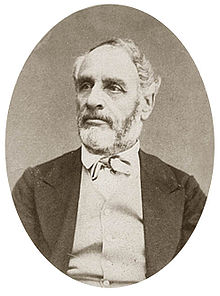Louis Charles Delescluze
Louis Charles Delescluze (born October 20, 1809 in Dreux , Département Eure-et-Loir , † May 25, 1871 in Paris ) was a French journalist and leading member of the Paris Commune in 1871.
Life
Delescluze studied law in Paris and developed democratic inclinations early on, he already played a role in the July Revolution of 1830 . He became a member of several republican clubs and was forced to flee to Belgium in 1836 due to his activities, where he devoted himself to republican journalism.
In 1835 he took over the editing of the Belgian "Journal de Charleroi" and in 1841 became editor-in-chief of the "Impartial du Nord" in Valenciennes . As a supporter of the February Revolution in 1848 he was then sent as a reward as General Commissioner of the Second French Republic in the Départements Nord and Pas-de-Calais , but came into conflict with the public prosecutor and had to submit his dismissal.
In the same year he founded the journal “La Révolution démocratique et la Liberté républicaine ” in Paris , but was soon sentenced to one and a half years in prison and a 10,000 franc fine and in 1849 even to deportation for his inflammatory socialist articles . He managed to escape to England, but returned to Paris in 1853 and was sentenced to four years in prison two months later as a member of banned societies. After spending several years in various prisons, he was deported to Devil's Island near Cayenne in French Guiana , where he stayed until November 1860.
About his imprisonment he published: “De Paris à Cayenne; journal d'un transporté ”(1867) . After his return he remained quiet for a long time until the journal "Réveil" , which he founded in 1868 and in which he represented the ideas of the First International , brought him new convictions. After the fall of the empire in 1870 as a result of the Franco-Prussian War , he believed he could implement his communist views, caused the uprising against the government of national defense on October 31, 1870 and after its failure was arrested but released without penalty. He also took part in the revolt of January 22, 1871. In the February 8 elections in the Département de la Seine he was elected a member of the National Assembly, but resigned his mandate after the March 18 uprising, on March 26 was elected a member of the Paris Commune .
Here he soon played an outstanding role. First a member of the External Affairs Commission, he joined the Executive Commission on April 4th, overthrew the Welfare Committee on May 9th and organized the election of a new one to become President. After the fall of Gustave Paul Cluseret and the resignation of Louis Rossel, he also took over the management of the war commission.
Filled with growing fanaticism, he developed tremendous energy. He suppressed all critical newspapers, tried to raise discipline among the armed masses and to strengthen the means of defense. Foreseeing the fall of the Paris Commune , at a meeting of the Commune on May 20, he motioned to set fire to all public buildings with petroleum and to shoot all hostages before the Republican military penetrated. After Delescluze found death on a barricade in Rue d'Angoulême on May 25, 1871 , he was sentenced to death in absentia in 1874.
literature
- Charles Delescluze: Affaire de la souscription Baudin: seul compte rendu complet, recueilli par la sténographie et revu par les défenseurs . Paris: A. Le Chevalier 1868.
- Charles Delescluze: De Paris à Cayenne: Journal d'un transporté . Paris: A. Le Chevalier 1869.
- German translation in Gustav Rasch: From Louis Bonaparte's debt register. Volume 1-2. Stuttgart, Kröner, 1870.
- Festschrift for Charles Delescluze:
- Jules Guesde: Le livre Rouge de la justice rurale: documents pour servir à l'histoire d'une république sans républicains; a la mémoire de Charles Delescluze . Paris: Editions d'Histoire Sociale 1871. Reprint 1968: (Ed. Par Jules Bazille, dit Jules, Guesde). Geneva: Imprimerie Blanchard; (Réimpr. :) Paris: Editions d'Histoire Sociale, 1868.
| personal data | |
|---|---|
| SURNAME | Delescluze, Louis Charles |
| ALTERNATIVE NAMES | Delescluze, Charles |
| BRIEF DESCRIPTION | French communist and member of the Paris Commune |
| DATE OF BIRTH | October 20, 1809 |
| PLACE OF BIRTH | Dreux |
| DATE OF DEATH | May 25, 1871 |
| Place of death | Paris |
